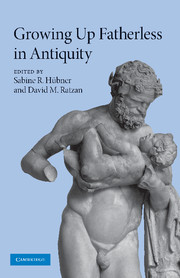Book contents
- Frontmatter
- Contents
- List of figures
- List of tables
- List of contributors
- Acknowledgments
- Note on abbreviations
- INTRODUCTION
- 1 Fatherless antiquity? Perspectives on “fatherlessness” in the ancient Mediterranean
- PART I COPING WITH DEMOGRAPHIC REALITIES
- PART II VIRTUAL FATHERLESSNESS
- PART III ROLES WITHOUT MODELS
- 8 Diomedes, the fatherless hero of the Iliad
- 9 Sons (and daughters) without fathers: fatherlessness in the Homeric epics
- 10 Absent Roman fathers in the writings of their daughters: Cornelia and Sulpicia
- PART IV RHETORIC OF LOSS
- Bibliography
- Index
9 - Sons (and daughters) without fathers: fatherlessness in the Homeric epics
Published online by Cambridge University Press: 30 July 2009
- Frontmatter
- Contents
- List of figures
- List of tables
- List of contributors
- Acknowledgments
- Note on abbreviations
- INTRODUCTION
- 1 Fatherless antiquity? Perspectives on “fatherlessness” in the ancient Mediterranean
- PART I COPING WITH DEMOGRAPHIC REALITIES
- PART II VIRTUAL FATHERLESSNESS
- PART III ROLES WITHOUT MODELS
- 8 Diomedes, the fatherless hero of the Iliad
- 9 Sons (and daughters) without fathers: fatherlessness in the Homeric epics
- 10 Absent Roman fathers in the writings of their daughters: Cornelia and Sulpicia
- PART IV RHETORIC OF LOSS
- Bibliography
- Index
Summary
Ioanni Kramer
collegae optimo
viro doctissimo
vere philologo sexagenario
As always in Homer we have before us an imaginary setting, one projected onto a time long before the written composition of the epic, based on oral tradition and reflecting the conditions of his own time, perhaps those of the last half of the eighth century bce. One must therefore exercise extreme caution in drawing conclusions about any underlying social realities: first and foremost the narrative must be understood in the context of its poetic world. At the most general level one can say that the figure and role of the father in both Homeric epics assumes a special importance: he is a symbol of a thoroughly patriarchal society and through him are projected the positive and negative aspects of this society. Some years ago I dealt at length with the image of the father and the relationship between fathers and sons in the Iliad and Odyssey, and I thereby attempted to describe how the idealization of the father, the social default, is undermined by bad fathers, and further how the very process of sons' becoming fathers calls into question this idealization. Now, as then, I am of the opinion that the concepts “father” and “son” cannot be mapped neatly onto kinship relations, since they also carry figurative meanings. Thus, for instance, Andromache describes her husband Hector as her “father” (Il. 6.429). Similarly, as we shall soon see, Telemachus has several surrogate or virtual “fathers.”
- Type
- Chapter
- Information
- Growing Up Fatherless in Antiquity , pp. 162 - 174Publisher: Cambridge University PressPrint publication year: 2009
- 1
- Cited by



